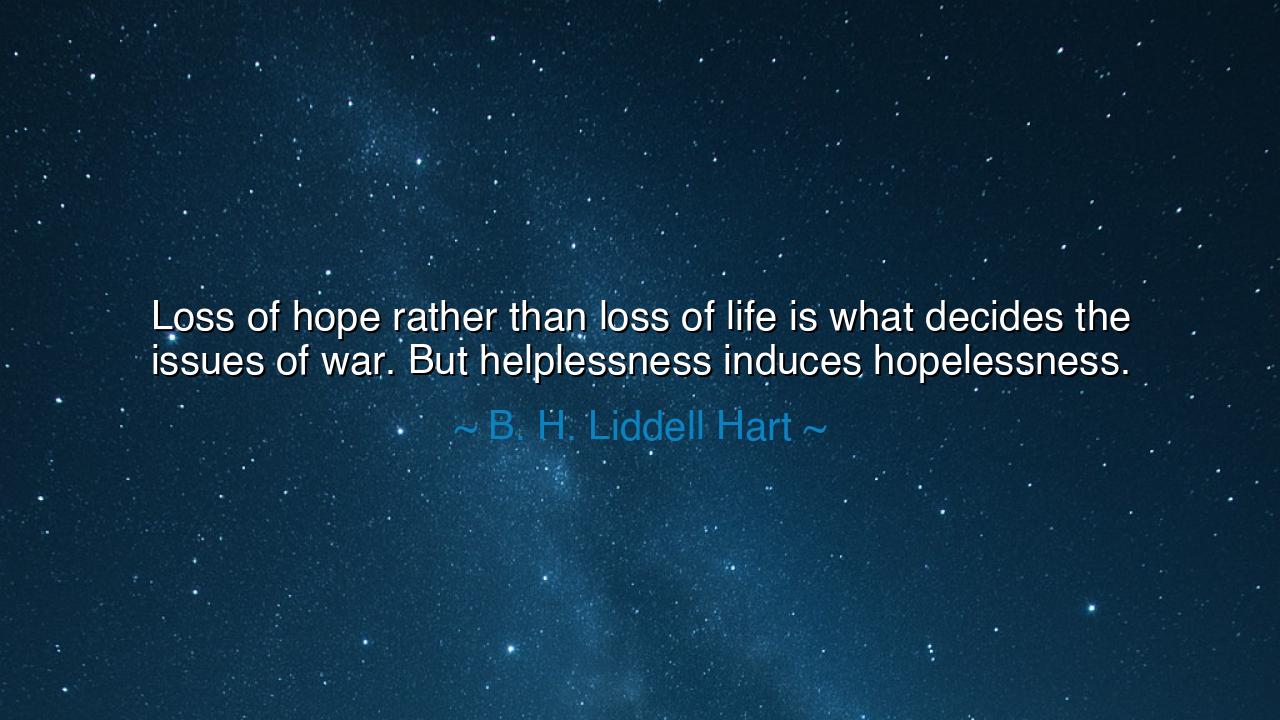
Loss of hope rather than loss of life is what decides the issues
Loss of hope rather than loss of life is what decides the issues of war. But helplessness induces hopelessness.






“Loss of hope rather than loss of life is what decides the issues of war. But helplessness induces hopelessness.” – B. H. Liddell Hart
In this powerful reflection, B. H. Liddell Hart, the great military historian and strategist, lifts our understanding of battle from the field of blood to the realm of the spirit. For he knew, as did the ancients, that wars are not won merely by armies, but by the will that drives them. His words speak of a truth deeper than tactics: that it is not the loss of life that brings defeat, but the loss of hope. When a people cease to believe that victory—or even survival—is possible, then their downfall is certain, no matter how many swords they still hold. And when they are made to feel helpless, when they no longer see a way forward, the light of hope flickers and dies, and the battle is lost long before the final blow is struck.
Liddell Hart wrote these words in the shadow of the great wars of the twentieth century, after witnessing the suffering of nations and the exhaustion of souls. He saw how, in the trenches of the First World War and in the burning cities of the Second, men fought not only enemies but despair itself. He studied the patterns of collapse and endurance, and he found that morale—the faith of a people in their cause, in their leaders, and in their future—was the true engine of triumph. It is hope, not strength, that carries nations through the darkness. Once hope dies, even the strongest fortress crumbles into dust.
Consider the fate of France in 1940, when the German armies swept across Europe. The French forces were numerous and brave, their weapons formidable, yet their spirit had been weakened by years of disillusionment and fear. When the enemy’s tanks broke through, it was not their courage that failed—it was their hope. They felt powerless before a storm that seemed unstoppable, and that helplessness gave birth to hopelessness. Within weeks, a proud nation laid down its arms. But across the English Channel, the people of Britain, though standing alone, refused to yield. Bombs fell upon London, cities burned, yet Winston Churchill spoke words of defiance that rekindled the embers of courage: “We shall never surrender.” And so, the battle continued—not because of superiority in arms, but because hope still lived in the hearts of the people.
Throughout history, the same truth has echoed. The Romans, besieged by barbarians, endured centuries because they believed in their destiny. The Spartans at Thermopylae, though facing certain death, held their ground because they fought for something eternal—the freedom of Greece. Even when their bodies perished, their hope became immortal, and that spirit outlasted their foes. The body can be broken; the soul can be bruised. But the death of hope is the death of all purpose. Thus, Liddell Hart teaches not merely soldiers, but all who struggle: that victory belongs to those who can still believe amid despair.
Yet we must heed his warning: “Helplessness induces hopelessness.” When men and women feel they have no power to change their fate, the seed of defeat is sown. This truth reaches beyond the battlefield—it lives in every struggle of the human heart. A man trapped in poverty, a woman fighting injustice, a people yearning for freedom—all are in peril when they begin to think their efforts are meaningless. For hopelessness is not born from failure, but from the belief that one’s actions no longer matter. To prevent this, one must first restore a sense of agency, a reminder that even in darkness, one’s choices still hold weight, one’s courage still matters.
O children of the future, learn from these words: guard your hope as you would guard your life, for it is the breath of the soul. Do not yield to helplessness, even when surrounded by shadows. Seek always to act, however small your action may seem, for in every act of will lies resistance against despair. Speak words of courage to those who falter, lift those who are bowed down, and you will become a light in the hearts of many. For nations are not defeated by death—they are defeated when their people cease to believe that dawn will come again.
The lesson is eternal: whether in war, in hardship, or in the quiet battles of the heart, hope is the final weapon of the just and the brave. Feed it, nurture it, and protect it. When the storm rises, stand firm and remember—loss of hope, not loss of life, is the true defeat. And even when you feel powerless, act in defiance of despair, for the smallest flame of hope is stronger than the vastest night.






AAdministratorAdministrator
Welcome, honored guests. Please leave a comment, we will respond soon